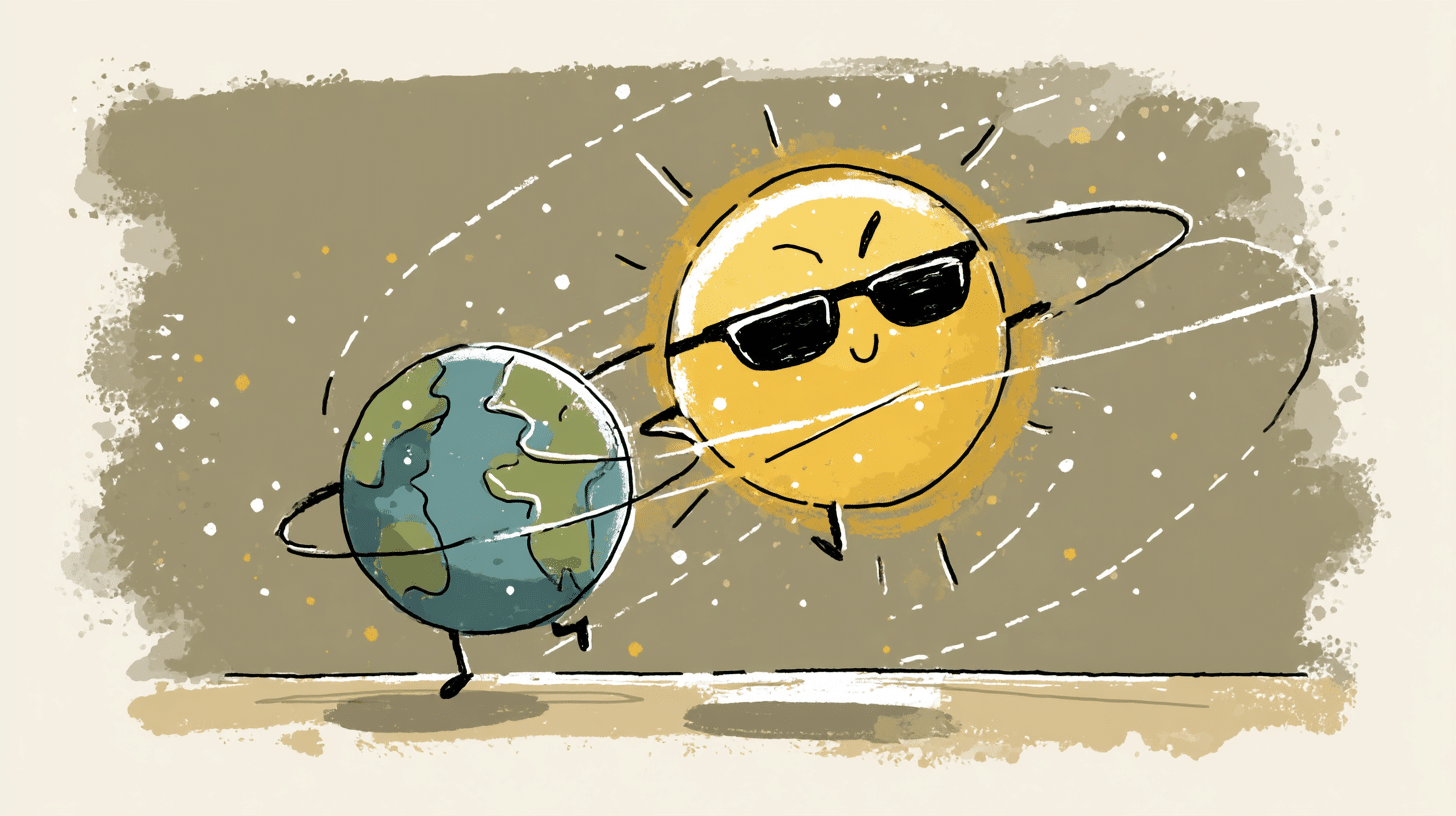Welcome, my intergalactic pancake.
You’ve probably looked up at the sky and thought:
“Wait… why are all those space balls spinning around that giant fireball like it’s the last taco at a space party?”
Well, I, Ned Neuron, lab coat wearer and microwave popcorn overcooker, am here to explain the science behind Why Do Planets Orbit the Sun?
Let’s dive in—preferably while wearing a helmet.
🪐 Step 1: What the Heck Is an Orbit?
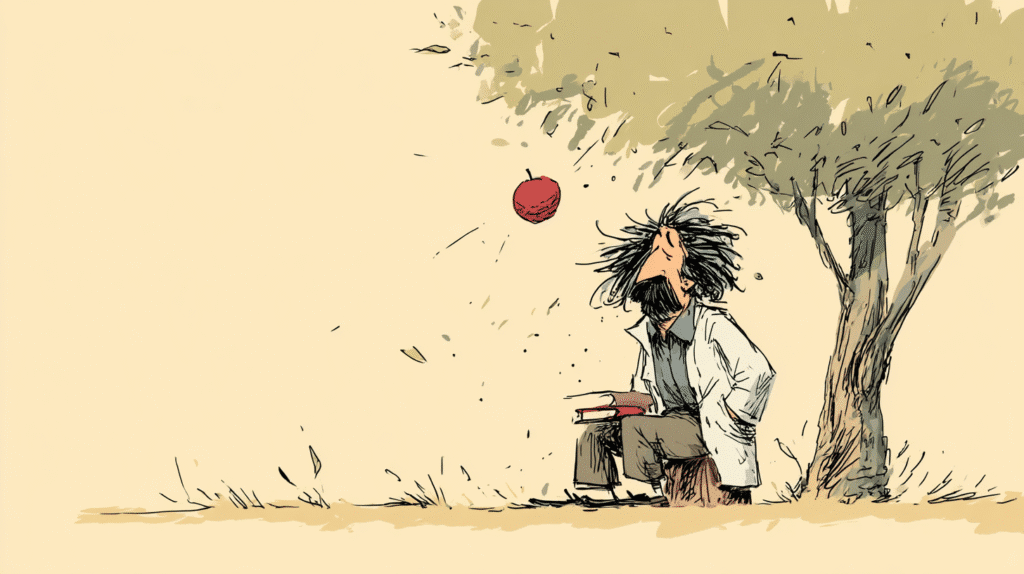
Picture this:
You’re standing on the tallest mountain on Earth (wearing socks with sandals, of course).
You yeet a tennis ball sideways as hard as you can. If you throw it:
- Kinda hard → it arcs and hits a goat
- Very hard → it arcs and lands 3 towns over
- SUPER hard (like orbital-speed hard) → it never lands. It just keeps falling around the Earth…
And voilà: it’s orbiting!
🧠 Orbits are just things falling forever but missing the ground every time.
Basically, the universe is full of klutzes.
☀️ Why the Sun? Why Not Pluto or… Jeff?
Planets orbit the Sun because the Sun is a gravitational beefcake.
It’s got 99.8% of all the mass in the solar system. That’s like showing up to a pizza party and eating 99.8% of the slices.
The Sun is the biggest thing in the room. So, by space law, everyone has to dance around it.
It’s so massive, it pulls everything toward it—including:
- Planets
- Comets
- Your attention span
- That one sock you lost in the dryer
🧠 Wanna read some goofy history after this science chaos?
Check out: How a War Started Because of a Bucket (War of the Oaken Bucket.) over on GiiggleGuru.
⚖️ Orbit = Gravity Tug-of-War + YOLO Speed
So, here’s how an orbit actually works (with zero math-induced nosebleeds):
- The Sun pulls the planet in (gravity)
- The planet is zooming sideways (momentum)
- These two forces cancel out just enough
- The planet enters an endless game of cosmic Ring-Around-the-Rosy
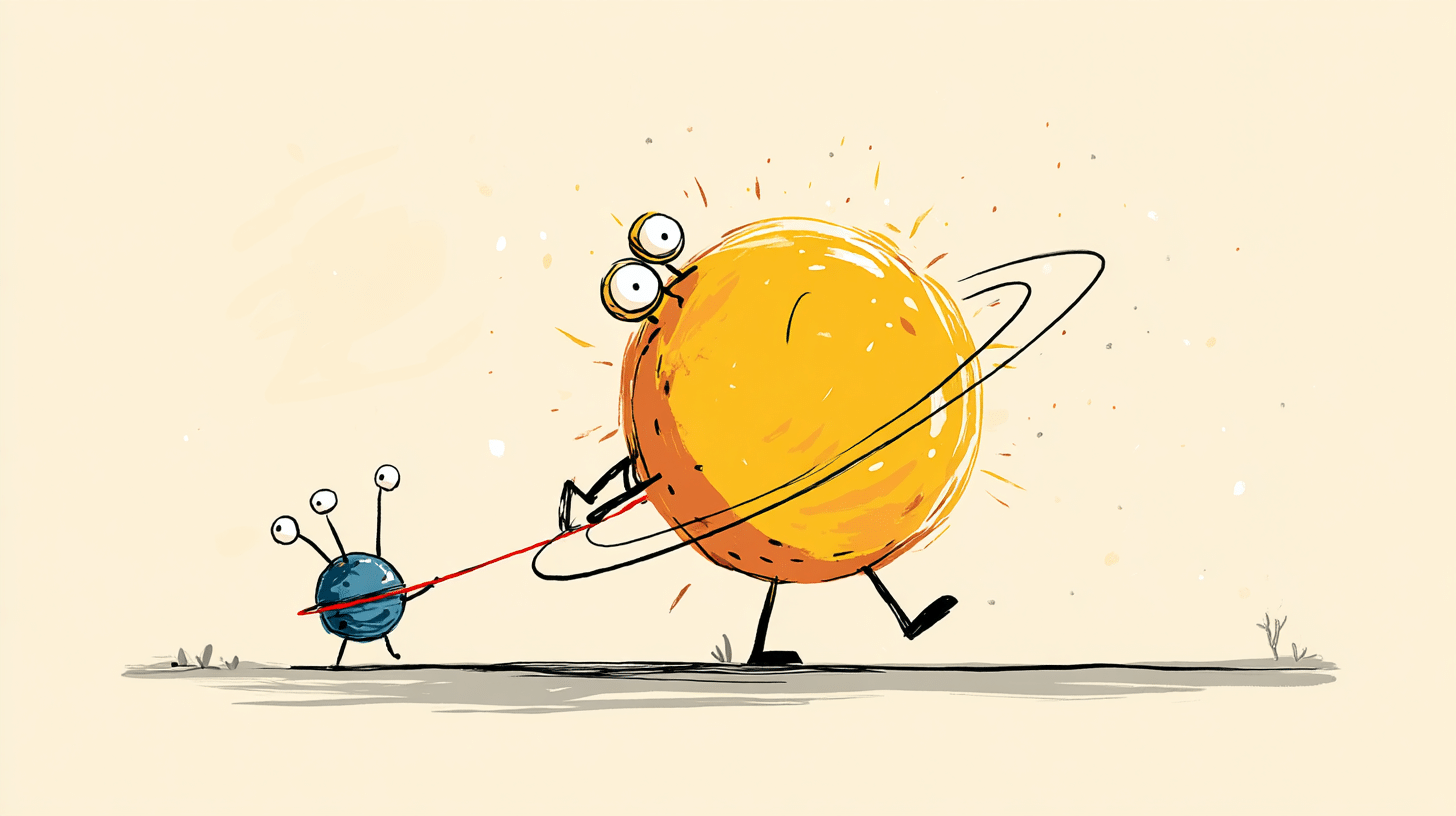
If gravity fully won → planets crash into the Sun
If momentum fully won → planets shoot into space like a rogue beach ball
But space is a diva, and likes balance.
So: eternal motion in a slightly squished loop.
💨 Wait, Why Don’t Planets Fly Off?
Imagine swinging a ball on a string around your head (don’t actually do this inside). The ball wants to zoom away, but the string keeps it spinning in a circle.
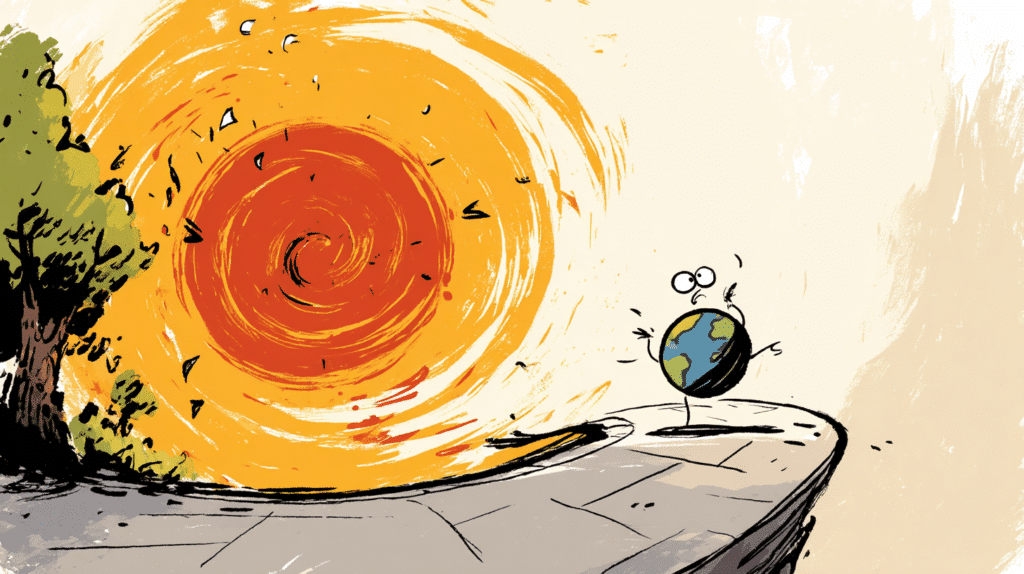
Now:
- The ball = planet
- The string = gravity
- You = the Sun (wear sunscreen)
Remove the string? Ball flies off.
Turn gravity off? Same thing.
Turn physics off entirely? Well, now you’re just living in a cartoon.
🌀 Why Not Square Orbits?
This is not Minecraft Space.
Planets follow elliptical orbits (squished circles), thanks to a math guy named Johannes Kepler, who definitely didn’t get invited to parties.
“Hey guys, I figured out that planets orbit in stretched circles!”
– Kepler, probably. Alone. With his telescope.
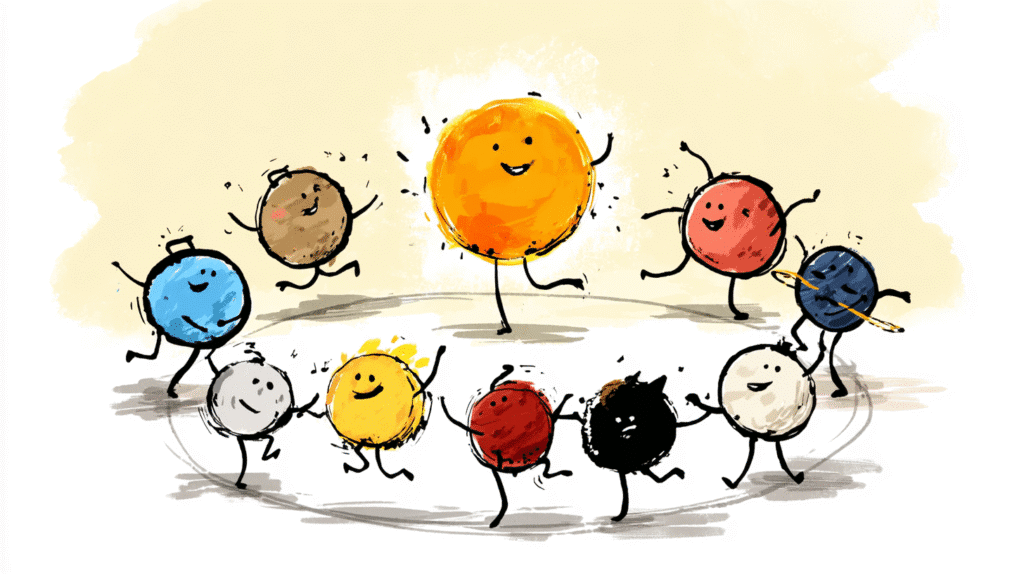
These orbits:
- Are predictable
- Are slightly squished
- Do not form triangles, pentagons, or heart shapes (we checked)
Mercury’s is a little chaotic. Pluto’s orbit is so weird it sometimes crosses Neptune. And comets? They swoop in and out like they forgot their wallet at the Sun’s place.
🚀 Okay but Like… Who’s in Charge?
Two nerd gods:
🔬 Isaac Newton
- Explained gravity
- Got bonked on the head by an apple (probably)
- Invented calculus to prove how hard gravity works (we forgive him)
🔭 Johannes Kepler
- Figured out orbits are ellipses, not circles
- Obsessed with Mars (who isn’t?)
Together they gave us:
- Physics
- GPS
- SpaceX
- That one dude who thinks the Moon landing was faked but believes in astrology
🌌 What If Earth Just… Stopped?
Let’s imagine Earth hits the brakes.
No more forward motion. No more orbit.
Just free-falling into the Sun like a spicy bowling ball.
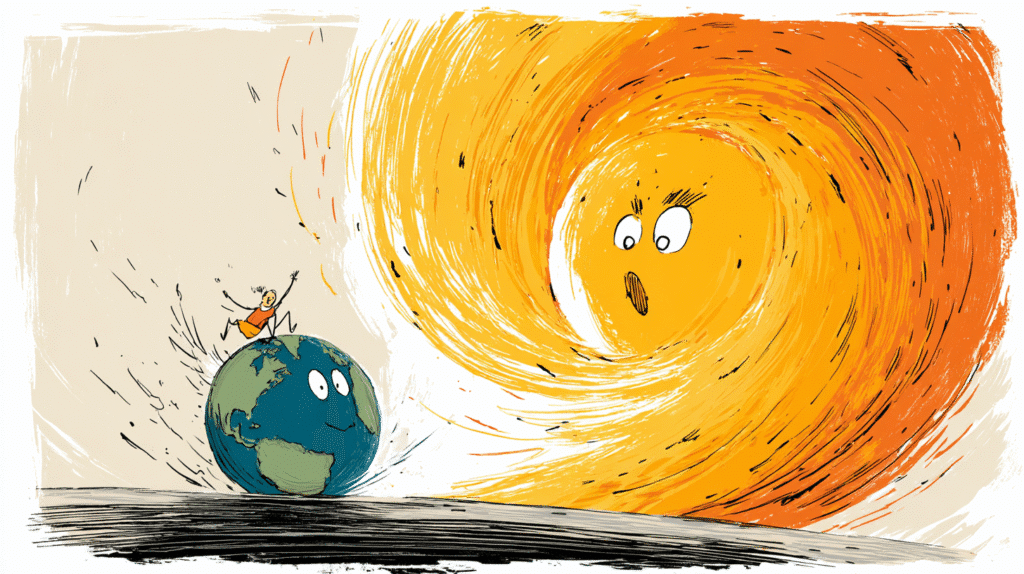
😬 How long would it take?
Answer: 65 days.
You’d have two months to:
- Cancel your Netflix subscription
- Make peace with your neighbor Carl
- Fry like cosmic bacon
💡 Ned’s Bonus Science Bomb:
“If Earth got 10% closer to the Sun, we’d all melt.
If we got 10% farther, we’d all freeze.
Space has zero chill.”
🧪 Real-World Orbits You Know and Love

- The Moon orbits Earth
- Earth orbits the Sun
- Satellites orbit Earth
- Your thoughts orbit that embarrassing thing you said 5 years ago
Even the International Space Station orbits Earth every 90 minutes. That’s faster than your pizza delivery.
🎯 TL;DR: Why Do Planets Orbit the Sun?
Because:
- The Sun is thicc
- Gravity pulls them in
- Momentum pushes them sideways
- Physics said “deal with it”
And that perfect combo creates orbits—aka space NASCAR for flaming rock marbles.
🎉 Ned’s Final Brain Fart:
“We’re all just passengers on a giant space rock, spinning around a giant space fireball, held in place by a force we can’t see, explained by dead dudes with telescopes.
And somehow… it works.”
So the next time someone says you’re spinning in circles—just tell them:
“I’m doing what planets do.”
🧼 Space Is Weird, and So Are We
So now you know:
Planets orbit the Sun because gravity pulls, momentum zooms, and space has less friction than a greased-up otter on a Slip ’N Slide.
It’s a beautiful cosmic dance.
A never-ending game of “Come here!” and “Nope, I’m moving sideways!”

Next Weird Thing: What If the Earth Suddenly Stopped Spinning? (Asking for Physics)
The Sun’s basically that clingy friend who throws great parties and traps everyone in its living room for 4.5 billion years.
And the planets? Just guests too polite (and too fast) to leave.
So the next time you’re spiraling emotionally, just remember—you’re also literally spiraling through space at 67,000 mph.
And somehow… it’s working.
Still confused? Good. That means your brain is orbiting a new idea.
Just don’t tell Newton—we don’t need another cannonball in the lab.

